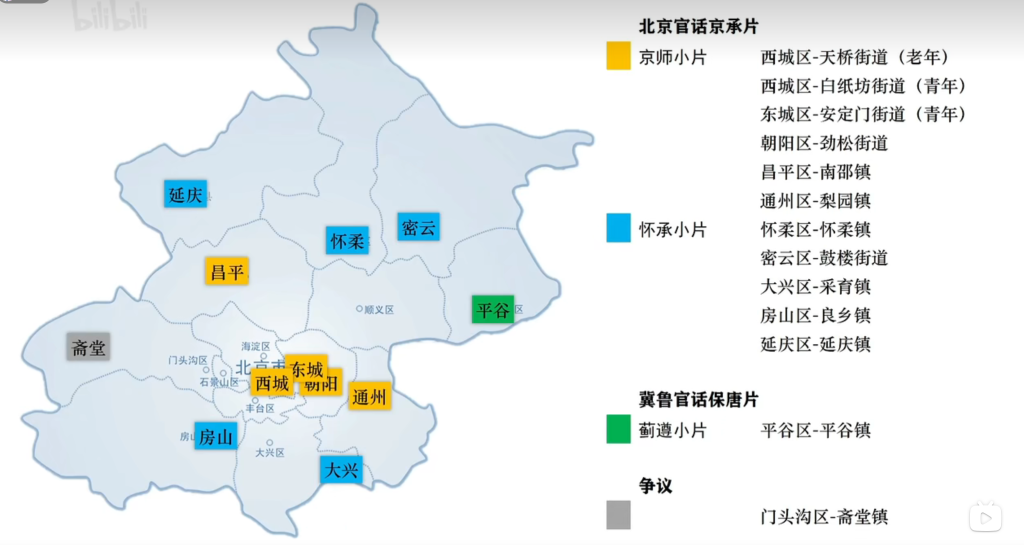Recordings of my local dialect
Beijing dialect

Speaker:
西城区 Xi Cheng district (senior)
西城区 Xi Cheng district (teenager)
东城区 Dong Cheng district(teenager)
朝阳区 Chao Yang district
昌平区 Chang Ping district
通州区 Tong Zhou district
怀柔区 Huai Rou district
密云区 Mi Yun district
大兴区 Da Xing district
房山区 Fang Shan district
延庆区 Yan Qing district
平谷区 Ping Gu district
门头沟区 Men Tou Gou district
This video shows how people from different districts (and ages) use the same sentence in their regional district.
The sentence is:
小张昨天钓了一条大鱼,我没有钓到鱼。 Xiao Zhang caught a big fish yesterday, but I didn’t catch any fish.
In the Beijing dialect, “昨天” (yesterday), says “昨儿” (Zuo er), “没有” (didn’t), says “没” (Mei), “钓到鱼” (catch the fish), says “钓着鱼” (Diao Zhao Yu), or “钓着” (Diao Zhao), omit “fish”.
When different people speak, the word order is sometimes different. This depends on the sense of language and is difficult to explain.
There are also some old Beijing dialects here:
炸了庙 (Zha Le Miao): amazement
练家子 (Lian Jia Zi): A person who can use Kong Fu
瞎了(Xia Le): It means bad luck, finished
摔咧子(Shuai Le Zi): Losing temper
拉了胯(La Le Kua): Submissive
大拿(Da Na): Person who can take charge
颠儿了(Dian er Le): Ran away
唏溜儿(Xi Liu er): Breathing in through the nose when speaking, means people are not agile.
点儿背(Dian er Bei): Bad luck
咕容(Gu Rong): Squirming
What needs to be emphasized is that these are all dialects from Beijing’s past. They are not documented in dictionaries and are more a result of oral traditions passed down through generations and the linguistic sensibilities formed from a young age due to environmental factors. The examples of these dialects mentioned above cannot represent all Beijingers, including myself. However, Beijing dialect does indeed have its unique characteristics. The customs and traditions of each region have nurtured the dialect of that area, which is a very interesting phenomenon.
Sound Histroy
Episode 1
Tom & Chris in the Rose Garden Cafe

“Sounding History” is a podcast hosted by Chris Smith from Texas Tech University in the USA and Tom Irvine from the University of Southampton in the UK. This podcast explores the global history of music with a unique perspective. It delves into the relationship between sound and the exploitation of Earth’s resources.
The hosts discuss how historical processes like colonialism, imperialism, and resource extraction have shaped 500 years of history and the world of sound we inhabit today. They concentrate on three core categories: labor, energy, and data. The hosts aim to create a platform for dialogue, insight, and storytelling, and they invite listeners to participate and engage with their content.
The podcast project stems from their shared academic and professional backgrounds. They hope to challenge established narratives, rethink how they engage with the world, and foster conversation and engagement between themselves and their listeners.
Reflection:
“Sounding History” combines music with fields such as history, climate change, culture, and resource development. This reminds us that when exploring issues, we can draw from various fields’ perspectives and concepts to gain a more comprehensive understanding. The podcast mentions interaction and engagement with the audience for collectively exploring topics. From this, I learned the importance of actively engaging with the audience in content creation to understand their feedback and viewpoints. Additionally, in this podcast, they delve into lesser-known sound stories from history, which has prompted me to contemplate the role of sound in history.